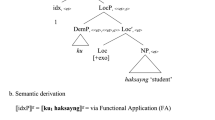Abstract
According to C.-T. Huand (1991), Chinese “A-not-a questions” are not syntactically unitary but fall into two types whose syntax has literally nothing in common. I argue that Huang is incorrect in assimilating the “disjunctive” variety of A-not-A questions to alternative questions, in that disjunctive questions are subject to a number of restrictions that do not apply to alternative questions, for example, a restriction that the positive conjunct precede the negative one. While accepting the basic idea of Huang's rule for “reduplicative” A-not-A questions, I note that restrictions on negation are mirrored not only in disjunctive questions where, for Huang the negative element is a real negation, but also in reduplicative questions, where for Huang there is only an apparent negation. I conclude that the full spectrum of A-not-A questions in Chinese reflects not synchronically unrelated constructions but rather different ways of specializing an, alternative question for the function of a yes-no question.
Similar content being viewed by others
References
Chomsky, Noam A. (1981)Lectures on Government and Binding, Foris, Dordrecht.
Dai, Xiang-ling (1992)Chinese Morphology and its Interface with Syntax, PhD dissertation, Ohio State University.
Huang, C.-T. James (1991) “Modularity and Chinese A-not-A Questions,” in C. Georgopolous and R. Ishihara (eds.).Interdisciplinary Approaches to Language: Essays in Honor of S.-Y. Kuroda, Kluwer Academic Publishers, Dordrecht, pp. 305–332.
Lakoff, George (1973) “Some Thoughts on Transderivational Constraints,” in B. Kachrue et al. (eds.),Issues in Linguistics, University of Illinois Press, Urbana and chicago, pp. 442–452.
Author information
Authors and Affiliations
Additional information
An earlier version, of this paper was presented at the First International Conference on Chinese Linguistics, Singapore, June 24, 1992. For comments on earlier drafts of this paper and discussion of the relevant examples, I am grateful to C.-T. James Huang, Jiang Zixin, Lin Fu-Wen, and two anonymous JEAL referees.
Rights and permissions
About this article
Cite this article
McCawley, J.D. Remarks on the syntax of Mandarin yes-no questions. J East Asian Linguis 3, 179–194 (1994). https://doi.org/10.1007/BF01736126
Received:
Revised:
Issue Date:
DOI: https://doi.org/10.1007/BF01736126




